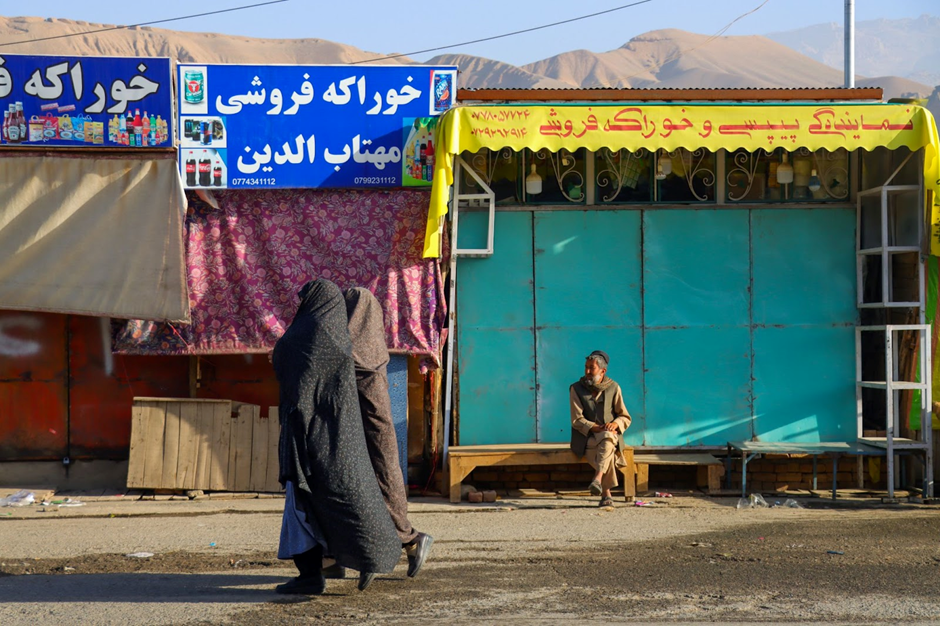Afghan Witness changed the name of the individual interviewed.
While it is the blue burqa that is often associated with Afghanistan, Morwarid, not her real name, has always favoured the brightly-hued traditional dresses of Afghanistan’s many cultures.
After graduating with a political science degree from a university in Mazar-i-Sharif, Balkh, and moving to Kabul, Morwarid and several friends decided to start a small business to promote the traditional clothes of Afghanistan.
The group of friends travelled to historical sites in Mazar-i-Sharif, Herat, Bamiyan and other provinces to do photoshoots. “The aim was to promote Afghanistan’s culture by connecting historical heritage with our dresses,” Morwarid says.
However, in August last year, after the Taliban seized Kabul, Morwarid, like many other small business owners, found herself facing uncertainty.
“We were planning to do a new series of photoshoots with models in some other provinces, but our work came to a sudden stop,” the young entrepreneur recalls.
Following the Taliban’s return, many people left the country, as did Morwarid’s business partner. “I was waiting for my evacuation, too, but since then, I have never heard when I would be evacuated from Afghanistan,” she says.
Morwarid adds that she has struggled with her mental health since the takeover – something that has been echoed by other Afghan women and girls who have been restricted from work and education – and a trend that was present even before the Taliban’s return.
“I lost my sleep routine and struggled to witness the humanitarian crisis that started unfolding in front of my eyes, with many women having lost their jobs.”
Facing restrictions
In Afghanistan, women’s employment levels fell by an estimated 16% in the third quarter of 2021. The Taliban have not explicitly banned women from working, but rights groups say their restrictions on other areas – such as women’s travel and gender segregation rules – have had knock-on effects.
After pausing her business, Morwarid says she started applying for jobs with NGOs (non-government organisations) still operating in Afghanistan, which required her to travel many times between Mazar-i-Sharif and Kabul. However, she says right now in Afghanistan, getting a job depends on who you know.
Morwarid didn’t give up, and decided to continue her business, attempting to adapt to the current situation. She invested some of her savings into buying jewellery and promoted her products online, but she says even this has been difficult.
“It may sound easy, but it’s not,” she adds. “We [women] are faced with a lot of restrictions and problems – we cannot move as freely as we would have wanted.”
 The Taliban have implemented restrictions upon women’s freedom of dress and travel | Image: Afghan Witness
The Taliban have implemented restrictions upon women’s freedom of dress and travel | Image: Afghan Witness
In December, a directive issued by the Taliban’s Ministry of Promotion of Virtue and Prevention of Vice, said women travelling for more than 45 miles (72km) should be accompanied by a close male family member. Such restrictions have made it difficult for Morwarid to run her business effectively, as she cannot take photographs of models wearing her jewellery and dresses.
“Currently, my whole world is my private room where I sleep, take pictures of my jewellery and carry out the tasks of my small business,” she says. “Since two months ago, I have been trying to revive it.”
According to Morwarid, restrictions vary depending on province and area. She says some areas in Kabul are “more open” – “girls wear simple headscarves without a burqa” she explains, but adds that “severe restrictions are in place for women in other provinces regarding their clothes and movement.”
Last September, women in Afghanistan started an online campaign using hashtags such as #DoNotTouchMyClothes and #AfghanistanCulture, alongside images of their most elaborate and colourful traditional dresses – an attempt to challenge the Taliban’s narrative on what Muslim women in Afghanistan should wear.
Morwarid says that after the Taliban announced that women should cover their faces in public in May, she was asked by a taxi driver why she was not covering her face or wearing black clothes.
“I said: this is my business – you better mind your own business.”
Misogynistic attitudes
Morwarid tells Afghan Witness (AW) that as a woman, it’s not just the Taliban she is afraid of, but some men who have the “same mentality towards women”.
“You would see them complain about lack of employment and how they are struggling economically, but none of them speak against the closure of schools for girls, or that their women have lost jobs because of the Taliban takeover,” she adds. “It’s disappointing that Afghan men do not stand with their women.”
Amnesty International recently released a report on the situation for women and girls in Afghanistan, concluding that the “scope, magnitude and severity” of violations are “increasing month to month”.
While there are many male campaigners – both within Afghanistan and internationally – who are advocating for Afghan women’s rights, Morwarid is concerned about the spread of misogyny since the takeover.
“Honestly, I am scared of Afghan men more than the Taliban right now,” she says. “The way they stare at you is as if you have committed an unforgivable crime.”
When Morwarid looks to the future, she’s not sure what it looks like. Like many young and educated people unable to leave – particularly those who are women – she struggles to see opportunities for herself if the situation continues like this.
“I still hope that if the Taliban say women can work without restrictions one day, I will stay in Afghanistan,” she says. “Otherwise, my country, Afghanistan, is not liveable, especially for women and girls.”


